Improving Healthcare Access for Aboriginal and Torres Strait Islanders
VerifiedAdded on 2023/06/03
|12
|2822
|151
Report
AI Summary
This report examines the healthcare disparities experienced by Aboriginal and Torres Strait Islander populations in Australia, highlighting the impact of remote living and cultural factors on access to adequate medical attention. It explores the historical and ongoing challenges, including the lack of timely government and non-government aid, chronic diseases, and increased mortality rates. The analysis includes data from the Aboriginal Community Controlled Health Services (ACCHS) Report Card 2016, key performance indicators, social determinants of health, and health outcomes, such as obesity and kidney disease. The report emphasizes the importance of cultural safety, respect, and the implementation of birthing-on-country models to improve healthcare delivery. The conclusion underscores the need for holistic healthcare development that considers social, emotional, and cultural well-being, as defined by the National Aboriginal Health Strategy, to achieve better health outcomes and address the inequalities faced by these communities.
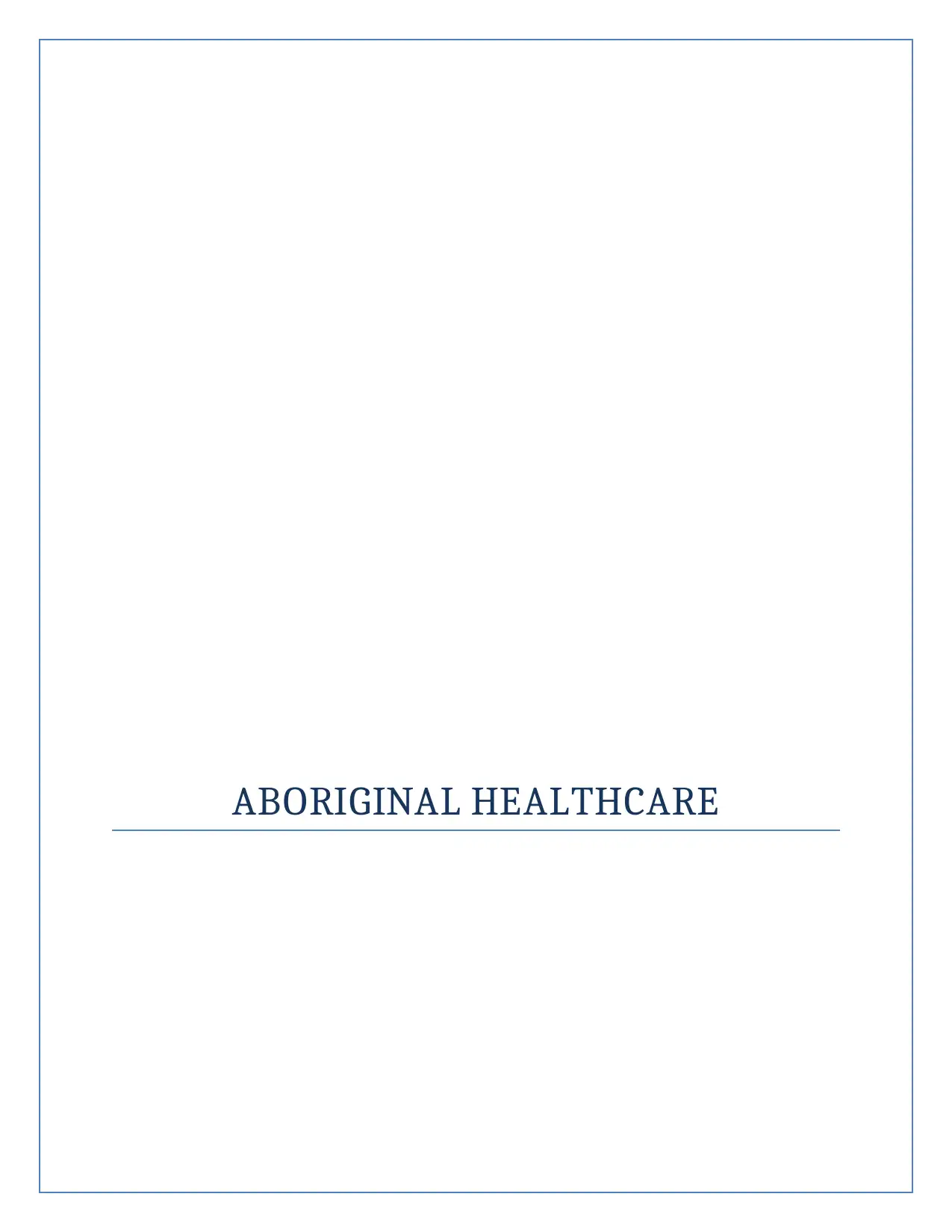
ABORIGINAL HEALTHCARE
Paraphrase This Document
Need a fresh take? Get an instant paraphrase of this document with our AI Paraphraser
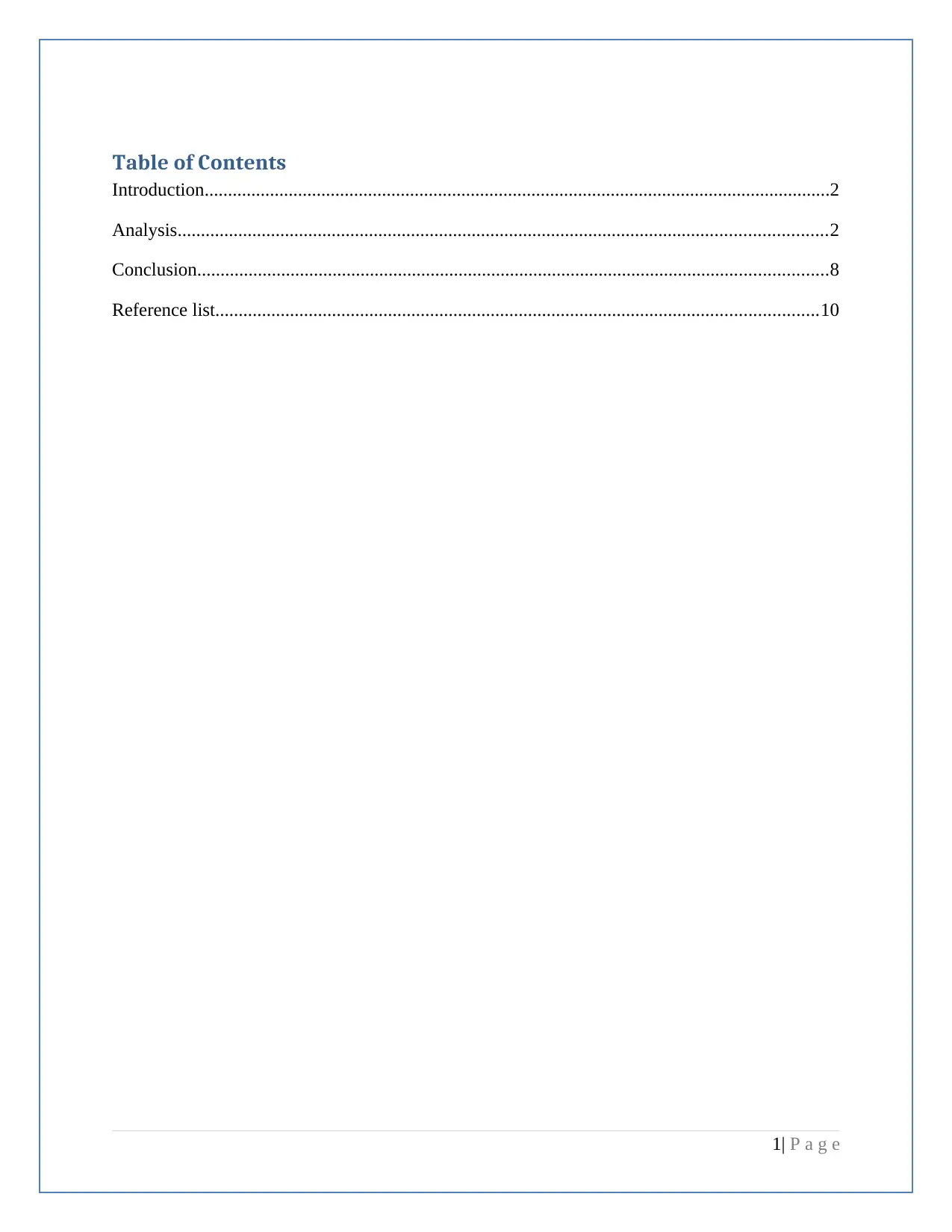
Table of Contents
Introduction......................................................................................................................................2
Analysis...........................................................................................................................................2
Conclusion.......................................................................................................................................8
Reference list.................................................................................................................................10
1| P a g e
Introduction......................................................................................................................................2
Analysis...........................................................................................................................................2
Conclusion.......................................................................................................................................8
Reference list.................................................................................................................................10
1| P a g e
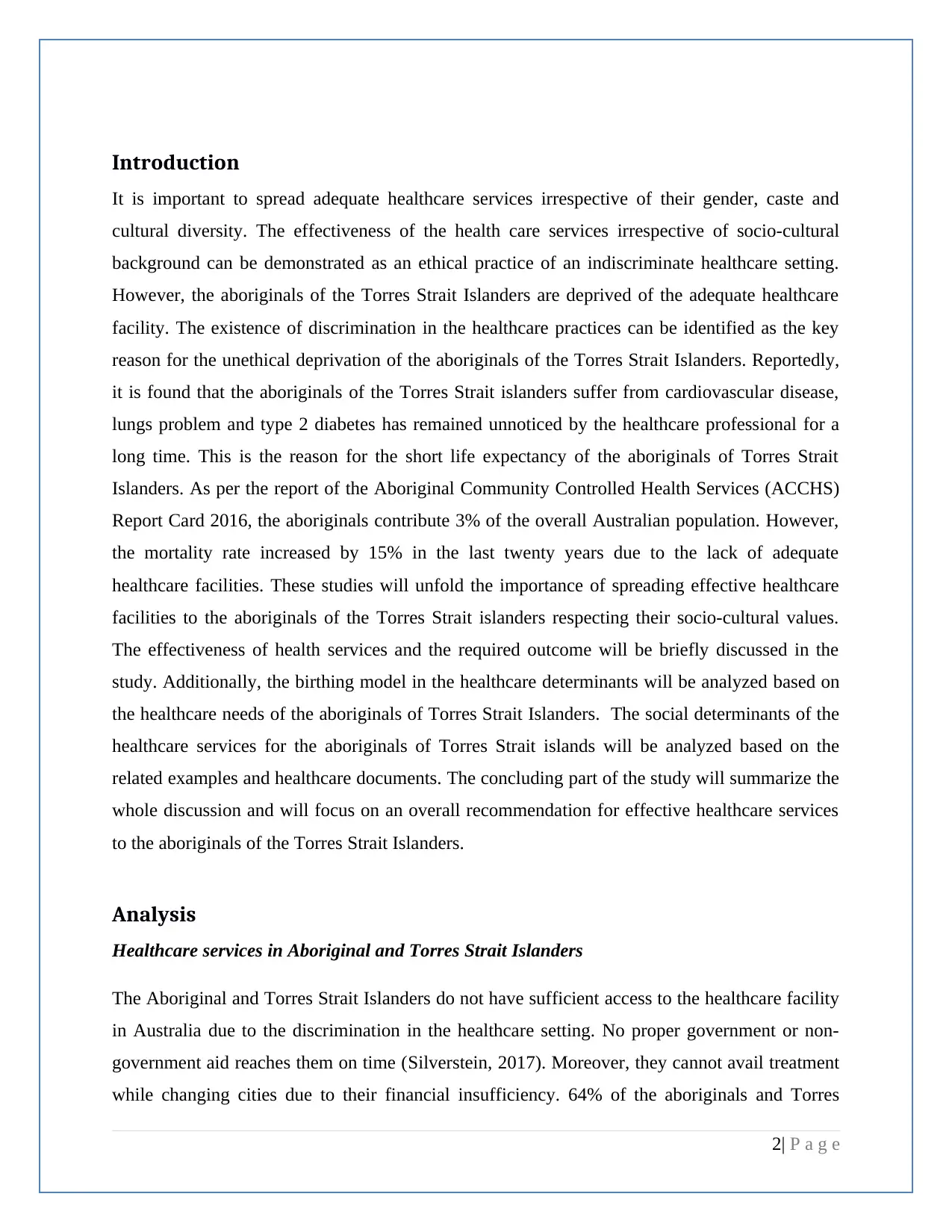
Introduction
It is important to spread adequate healthcare services irrespective of their gender, caste and
cultural diversity. The effectiveness of the health care services irrespective of socio-cultural
background can be demonstrated as an ethical practice of an indiscriminate healthcare setting.
However, the aboriginals of the Torres Strait Islanders are deprived of the adequate healthcare
facility. The existence of discrimination in the healthcare practices can be identified as the key
reason for the unethical deprivation of the aboriginals of the Torres Strait Islanders. Reportedly,
it is found that the aboriginals of the Torres Strait islanders suffer from cardiovascular disease,
lungs problem and type 2 diabetes has remained unnoticed by the healthcare professional for a
long time. This is the reason for the short life expectancy of the aboriginals of Torres Strait
Islanders. As per the report of the Aboriginal Community Controlled Health Services (ACCHS)
Report Card 2016, the aboriginals contribute 3% of the overall Australian population. However,
the mortality rate increased by 15% in the last twenty years due to the lack of adequate
healthcare facilities. These studies will unfold the importance of spreading effective healthcare
facilities to the aboriginals of the Torres Strait islanders respecting their socio-cultural values.
The effectiveness of health services and the required outcome will be briefly discussed in the
study. Additionally, the birthing model in the healthcare determinants will be analyzed based on
the healthcare needs of the aboriginals of Torres Strait Islanders. The social determinants of the
healthcare services for the aboriginals of Torres Strait islands will be analyzed based on the
related examples and healthcare documents. The concluding part of the study will summarize the
whole discussion and will focus on an overall recommendation for effective healthcare services
to the aboriginals of the Torres Strait Islanders.
Analysis
Healthcare services in Aboriginal and Torres Strait Islanders
The Aboriginal and Torres Strait Islanders do not have sufficient access to the healthcare facility
in Australia due to the discrimination in the healthcare setting. No proper government or non-
government aid reaches them on time (Silverstein, 2017). Moreover, they cannot avail treatment
while changing cities due to their financial insufficiency. 64% of the aboriginals and Torres
2| P a g e
It is important to spread adequate healthcare services irrespective of their gender, caste and
cultural diversity. The effectiveness of the health care services irrespective of socio-cultural
background can be demonstrated as an ethical practice of an indiscriminate healthcare setting.
However, the aboriginals of the Torres Strait Islanders are deprived of the adequate healthcare
facility. The existence of discrimination in the healthcare practices can be identified as the key
reason for the unethical deprivation of the aboriginals of the Torres Strait Islanders. Reportedly,
it is found that the aboriginals of the Torres Strait islanders suffer from cardiovascular disease,
lungs problem and type 2 diabetes has remained unnoticed by the healthcare professional for a
long time. This is the reason for the short life expectancy of the aboriginals of Torres Strait
Islanders. As per the report of the Aboriginal Community Controlled Health Services (ACCHS)
Report Card 2016, the aboriginals contribute 3% of the overall Australian population. However,
the mortality rate increased by 15% in the last twenty years due to the lack of adequate
healthcare facilities. These studies will unfold the importance of spreading effective healthcare
facilities to the aboriginals of the Torres Strait islanders respecting their socio-cultural values.
The effectiveness of health services and the required outcome will be briefly discussed in the
study. Additionally, the birthing model in the healthcare determinants will be analyzed based on
the healthcare needs of the aboriginals of Torres Strait Islanders. The social determinants of the
healthcare services for the aboriginals of Torres Strait islands will be analyzed based on the
related examples and healthcare documents. The concluding part of the study will summarize the
whole discussion and will focus on an overall recommendation for effective healthcare services
to the aboriginals of the Torres Strait Islanders.
Analysis
Healthcare services in Aboriginal and Torres Strait Islanders
The Aboriginal and Torres Strait Islanders do not have sufficient access to the healthcare facility
in Australia due to the discrimination in the healthcare setting. No proper government or non-
government aid reaches them on time (Silverstein, 2017). Moreover, they cannot avail treatment
while changing cities due to their financial insufficiency. 64% of the aboriginals and Torres
2| P a g e
⊘ This is a preview!⊘
Do you want full access?
Subscribe today to unlock all pages.

Trusted by 1+ million students worldwide
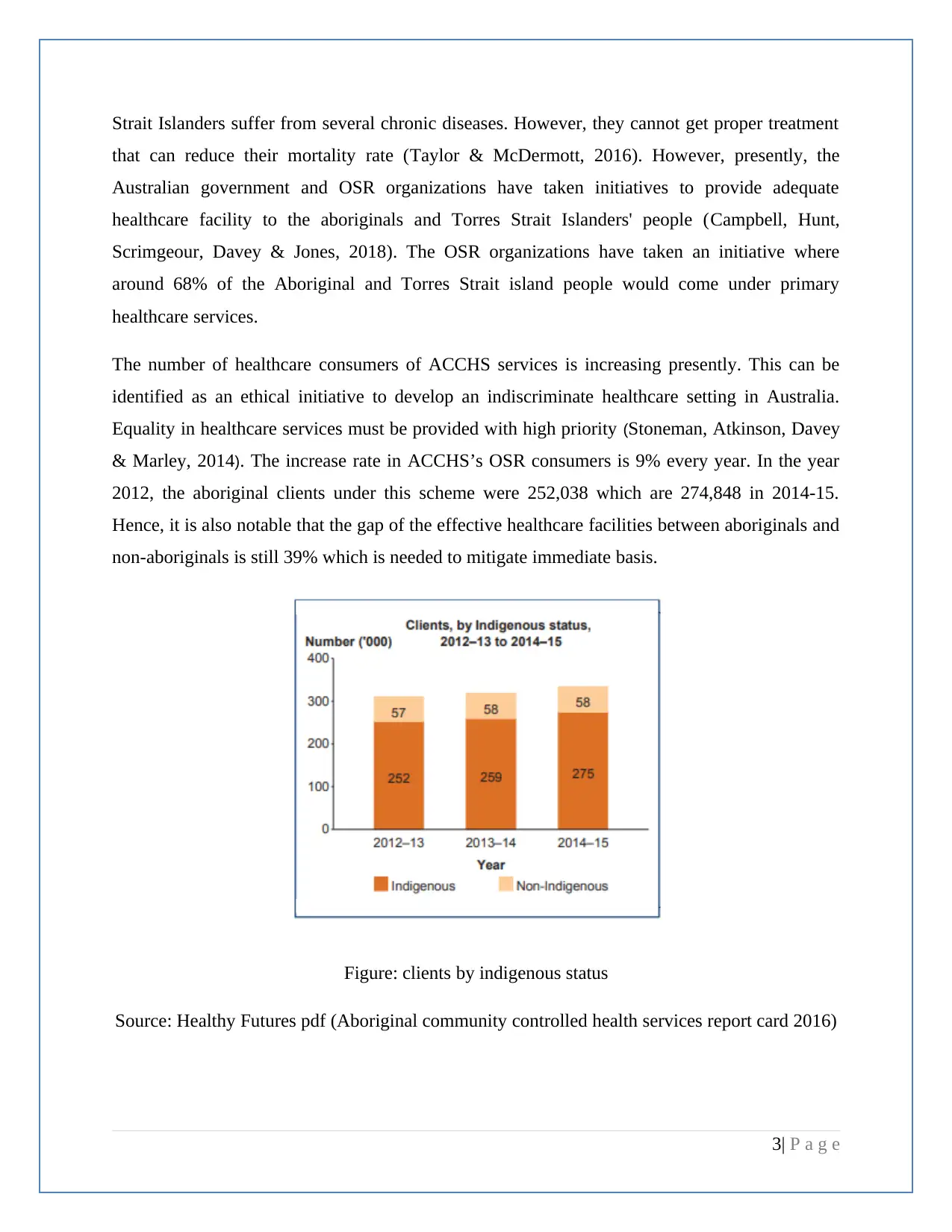
Strait Islanders suffer from several chronic diseases. However, they cannot get proper treatment
that can reduce their mortality rate (Taylor & McDermott, 2016). However, presently, the
Australian government and OSR organizations have taken initiatives to provide adequate
healthcare facility to the aboriginals and Torres Strait Islanders' people (Campbell, Hunt,
Scrimgeour, Davey & Jones, 2018). The OSR organizations have taken an initiative where
around 68% of the Aboriginal and Torres Strait island people would come under primary
healthcare services.
The number of healthcare consumers of ACCHS services is increasing presently. This can be
identified as an ethical initiative to develop an indiscriminate healthcare setting in Australia.
Equality in healthcare services must be provided with high priority (Stoneman, Atkinson, Davey
& Marley, 2014). The increase rate in ACCHS’s OSR consumers is 9% every year. In the year
2012, the aboriginal clients under this scheme were 252,038 which are 274,848 in 2014-15.
Hence, it is also notable that the gap of the effective healthcare facilities between aboriginals and
non-aboriginals is still 39% which is needed to mitigate immediate basis.
Figure: clients by indigenous status
Source: Healthy Futures pdf (Aboriginal community controlled health services report card 2016)
3| P a g e
that can reduce their mortality rate (Taylor & McDermott, 2016). However, presently, the
Australian government and OSR organizations have taken initiatives to provide adequate
healthcare facility to the aboriginals and Torres Strait Islanders' people (Campbell, Hunt,
Scrimgeour, Davey & Jones, 2018). The OSR organizations have taken an initiative where
around 68% of the Aboriginal and Torres Strait island people would come under primary
healthcare services.
The number of healthcare consumers of ACCHS services is increasing presently. This can be
identified as an ethical initiative to develop an indiscriminate healthcare setting in Australia.
Equality in healthcare services must be provided with high priority (Stoneman, Atkinson, Davey
& Marley, 2014). The increase rate in ACCHS’s OSR consumers is 9% every year. In the year
2012, the aboriginal clients under this scheme were 252,038 which are 274,848 in 2014-15.
Hence, it is also notable that the gap of the effective healthcare facilities between aboriginals and
non-aboriginals is still 39% which is needed to mitigate immediate basis.
Figure: clients by indigenous status
Source: Healthy Futures pdf (Aboriginal community controlled health services report card 2016)
3| P a g e
Paraphrase This Document
Need a fresh take? Get an instant paraphrase of this document with our AI Paraphraser
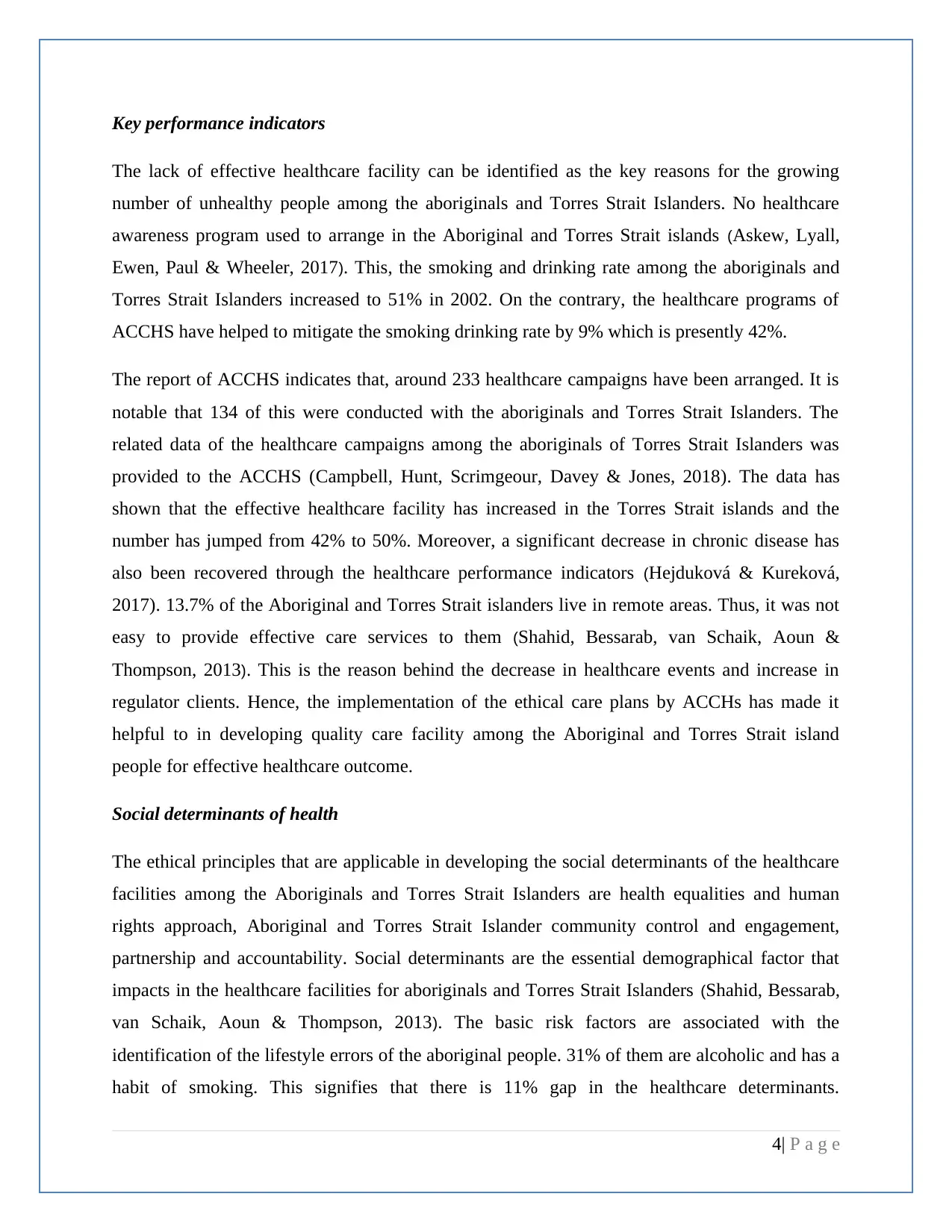
Key performance indicators
The lack of effective healthcare facility can be identified as the key reasons for the growing
number of unhealthy people among the aboriginals and Torres Strait Islanders. No healthcare
awareness program used to arrange in the Aboriginal and Torres Strait islands (Askew, Lyall,
Ewen, Paul & Wheeler, 2017). This, the smoking and drinking rate among the aboriginals and
Torres Strait Islanders increased to 51% in 2002. On the contrary, the healthcare programs of
ACCHS have helped to mitigate the smoking drinking rate by 9% which is presently 42%.
The report of ACCHS indicates that, around 233 healthcare campaigns have been arranged. It is
notable that 134 of this were conducted with the aboriginals and Torres Strait Islanders. The
related data of the healthcare campaigns among the aboriginals of Torres Strait Islanders was
provided to the ACCHS (Campbell, Hunt, Scrimgeour, Davey & Jones, 2018). The data has
shown that the effective healthcare facility has increased in the Torres Strait islands and the
number has jumped from 42% to 50%. Moreover, a significant decrease in chronic disease has
also been recovered through the healthcare performance indicators (Hejduková & Kureková,
2017). 13.7% of the Aboriginal and Torres Strait islanders live in remote areas. Thus, it was not
easy to provide effective care services to them (Shahid, Bessarab, van Schaik, Aoun &
Thompson, 2013). This is the reason behind the decrease in healthcare events and increase in
regulator clients. Hence, the implementation of the ethical care plans by ACCHs has made it
helpful to in developing quality care facility among the Aboriginal and Torres Strait island
people for effective healthcare outcome.
Social determinants of health
The ethical principles that are applicable in developing the social determinants of the healthcare
facilities among the Aboriginals and Torres Strait Islanders are health equalities and human
rights approach, Aboriginal and Torres Strait Islander community control and engagement,
partnership and accountability. Social determinants are the essential demographical factor that
impacts in the healthcare facilities for aboriginals and Torres Strait Islanders (Shahid, Bessarab,
van Schaik, Aoun & Thompson, 2013). The basic risk factors are associated with the
identification of the lifestyle errors of the aboriginal people. 31% of them are alcoholic and has a
habit of smoking. This signifies that there is 11% gap in the healthcare determinants.
4| P a g e
The lack of effective healthcare facility can be identified as the key reasons for the growing
number of unhealthy people among the aboriginals and Torres Strait Islanders. No healthcare
awareness program used to arrange in the Aboriginal and Torres Strait islands (Askew, Lyall,
Ewen, Paul & Wheeler, 2017). This, the smoking and drinking rate among the aboriginals and
Torres Strait Islanders increased to 51% in 2002. On the contrary, the healthcare programs of
ACCHS have helped to mitigate the smoking drinking rate by 9% which is presently 42%.
The report of ACCHS indicates that, around 233 healthcare campaigns have been arranged. It is
notable that 134 of this were conducted with the aboriginals and Torres Strait Islanders. The
related data of the healthcare campaigns among the aboriginals of Torres Strait Islanders was
provided to the ACCHS (Campbell, Hunt, Scrimgeour, Davey & Jones, 2018). The data has
shown that the effective healthcare facility has increased in the Torres Strait islands and the
number has jumped from 42% to 50%. Moreover, a significant decrease in chronic disease has
also been recovered through the healthcare performance indicators (Hejduková & Kureková,
2017). 13.7% of the Aboriginal and Torres Strait islanders live in remote areas. Thus, it was not
easy to provide effective care services to them (Shahid, Bessarab, van Schaik, Aoun &
Thompson, 2013). This is the reason behind the decrease in healthcare events and increase in
regulator clients. Hence, the implementation of the ethical care plans by ACCHs has made it
helpful to in developing quality care facility among the Aboriginal and Torres Strait island
people for effective healthcare outcome.
Social determinants of health
The ethical principles that are applicable in developing the social determinants of the healthcare
facilities among the Aboriginals and Torres Strait Islanders are health equalities and human
rights approach, Aboriginal and Torres Strait Islander community control and engagement,
partnership and accountability. Social determinants are the essential demographical factor that
impacts in the healthcare facilities for aboriginals and Torres Strait Islanders (Shahid, Bessarab,
van Schaik, Aoun & Thompson, 2013). The basic risk factors are associated with the
identification of the lifestyle errors of the aboriginal people. 31% of them are alcoholic and has a
habit of smoking. This signifies that there is 11% gap in the healthcare determinants.
4| P a g e
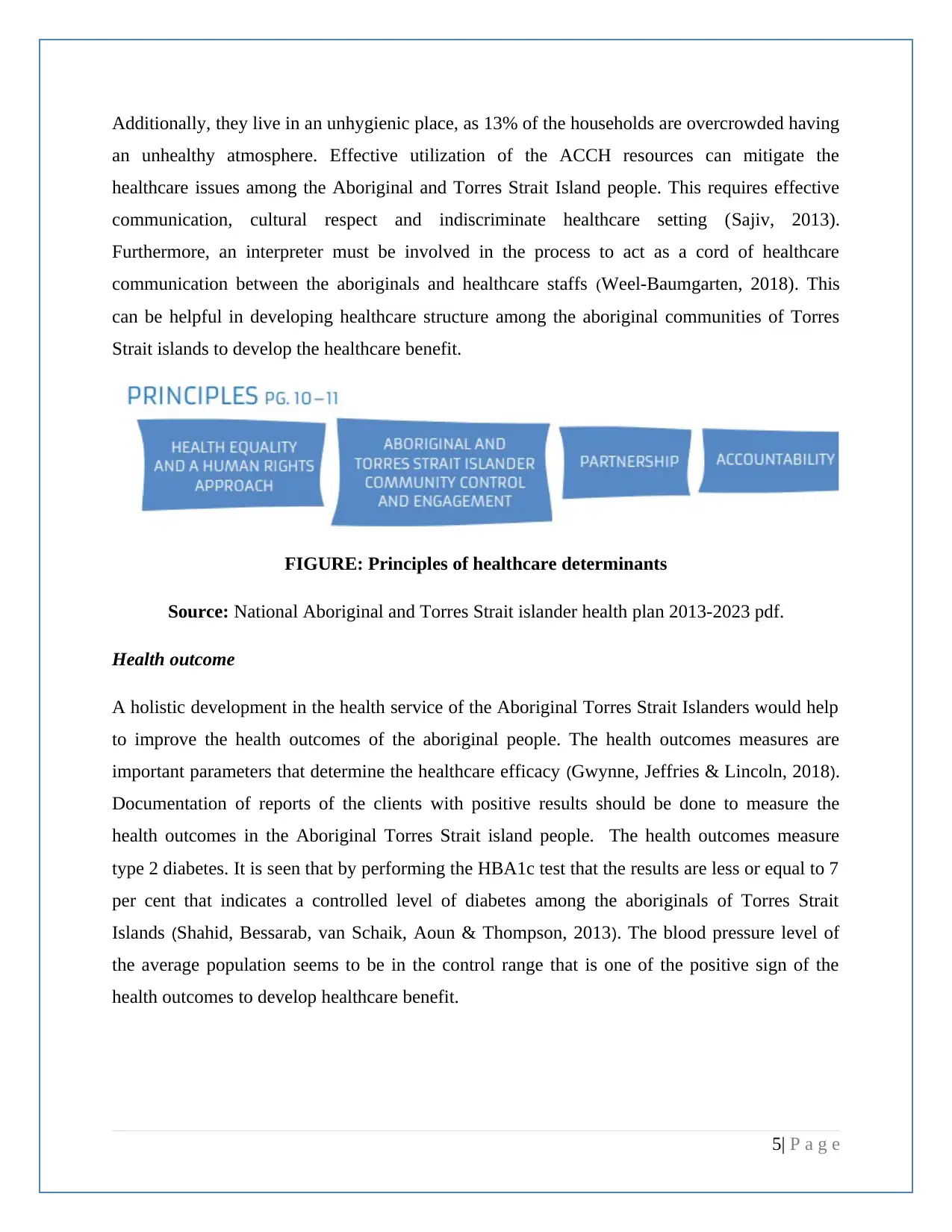
Additionally, they live in an unhygienic place, as 13% of the households are overcrowded having
an unhealthy atmosphere. Effective utilization of the ACCH resources can mitigate the
healthcare issues among the Aboriginal and Torres Strait Island people. This requires effective
communication, cultural respect and indiscriminate healthcare setting (Sajiv, 2013).
Furthermore, an interpreter must be involved in the process to act as a cord of healthcare
communication between the aboriginals and healthcare staffs (Weel-Baumgarten, 2018). This
can be helpful in developing healthcare structure among the aboriginal communities of Torres
Strait islands to develop the healthcare benefit.
FIGURE: Principles of healthcare determinants
Source: National Aboriginal and Torres Strait islander health plan 2013-2023 pdf.
Health outcome
A holistic development in the health service of the Aboriginal Torres Strait Islanders would help
to improve the health outcomes of the aboriginal people. The health outcomes measures are
important parameters that determine the healthcare efficacy (Gwynne, Jeffries & Lincoln, 2018).
Documentation of reports of the clients with positive results should be done to measure the
health outcomes in the Aboriginal Torres Strait island people. The health outcomes measure
type 2 diabetes. It is seen that by performing the HBA1c test that the results are less or equal to 7
per cent that indicates a controlled level of diabetes among the aboriginals of Torres Strait
Islands (Shahid, Bessarab, van Schaik, Aoun & Thompson, 2013). The blood pressure level of
the average population seems to be in the control range that is one of the positive sign of the
health outcomes to develop healthcare benefit.
5| P a g e
an unhealthy atmosphere. Effective utilization of the ACCH resources can mitigate the
healthcare issues among the Aboriginal and Torres Strait Island people. This requires effective
communication, cultural respect and indiscriminate healthcare setting (Sajiv, 2013).
Furthermore, an interpreter must be involved in the process to act as a cord of healthcare
communication between the aboriginals and healthcare staffs (Weel-Baumgarten, 2018). This
can be helpful in developing healthcare structure among the aboriginal communities of Torres
Strait islands to develop the healthcare benefit.
FIGURE: Principles of healthcare determinants
Source: National Aboriginal and Torres Strait islander health plan 2013-2023 pdf.
Health outcome
A holistic development in the health service of the Aboriginal Torres Strait Islanders would help
to improve the health outcomes of the aboriginal people. The health outcomes measures are
important parameters that determine the healthcare efficacy (Gwynne, Jeffries & Lincoln, 2018).
Documentation of reports of the clients with positive results should be done to measure the
health outcomes in the Aboriginal Torres Strait island people. The health outcomes measure
type 2 diabetes. It is seen that by performing the HBA1c test that the results are less or equal to 7
per cent that indicates a controlled level of diabetes among the aboriginals of Torres Strait
Islands (Shahid, Bessarab, van Schaik, Aoun & Thompson, 2013). The blood pressure level of
the average population seems to be in the control range that is one of the positive sign of the
health outcomes to develop healthcare benefit.
5| P a g e
⊘ This is a preview!⊘
Do you want full access?
Subscribe today to unlock all pages.

Trusted by 1+ million students worldwide
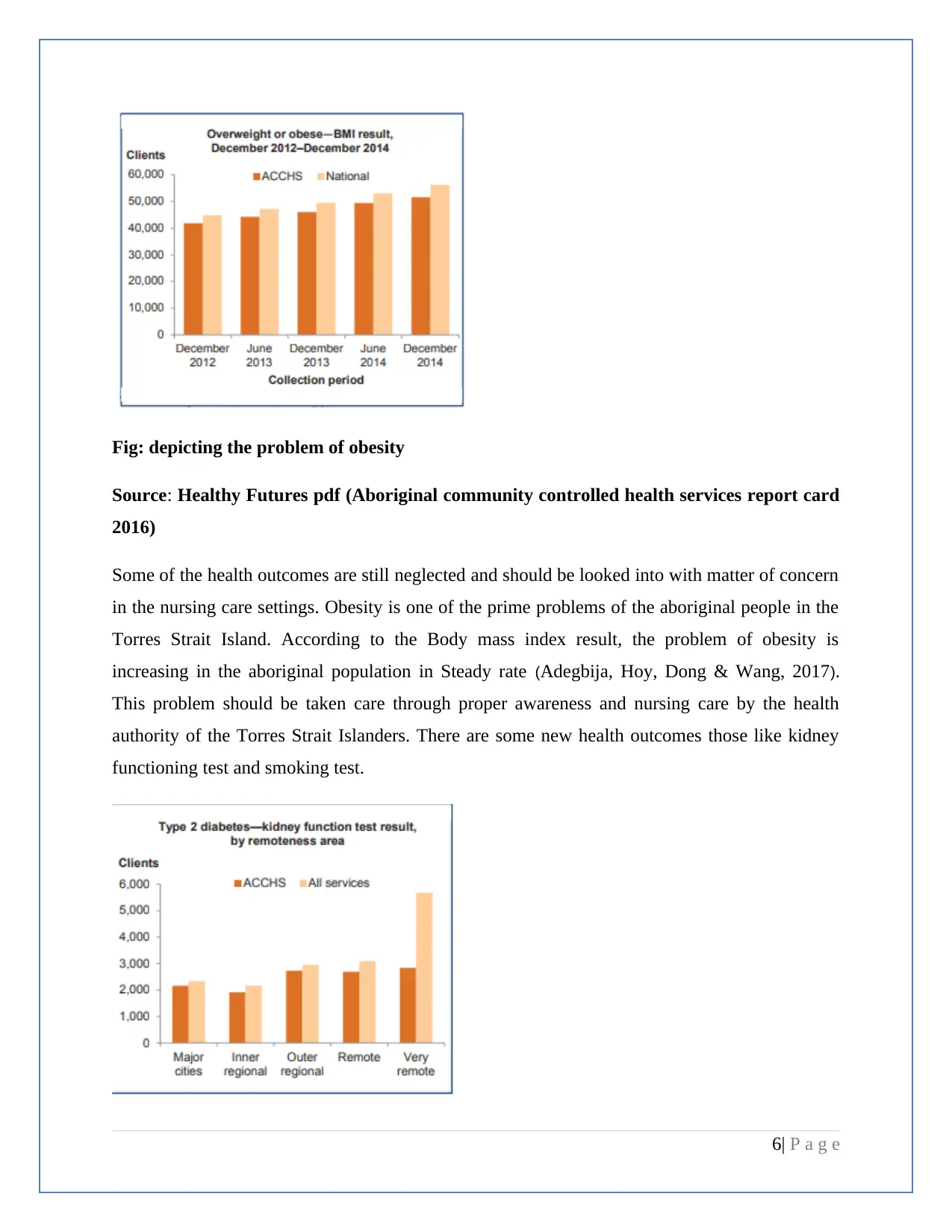
Fig: depicting the problem of obesity
Source: Healthy Futures pdf (Aboriginal community controlled health services report card
2016)
Some of the health outcomes are still neglected and should be looked into with matter of concern
in the nursing care settings. Obesity is one of the prime problems of the aboriginal people in the
Torres Strait Island. According to the Body mass index result, the problem of obesity is
increasing in the aboriginal population in Steady rate (Adegbija, Hoy, Dong & Wang, 2017).
This problem should be taken care through proper awareness and nursing care by the health
authority of the Torres Strait Islanders. There are some new health outcomes those like kidney
functioning test and smoking test.
6| P a g e
Source: Healthy Futures pdf (Aboriginal community controlled health services report card
2016)
Some of the health outcomes are still neglected and should be looked into with matter of concern
in the nursing care settings. Obesity is one of the prime problems of the aboriginal people in the
Torres Strait Island. According to the Body mass index result, the problem of obesity is
increasing in the aboriginal population in Steady rate (Adegbija, Hoy, Dong & Wang, 2017).
This problem should be taken care through proper awareness and nursing care by the health
authority of the Torres Strait Islanders. There are some new health outcomes those like kidney
functioning test and smoking test.
6| P a g e
Paraphrase This Document
Need a fresh take? Get an instant paraphrase of this document with our AI Paraphraser
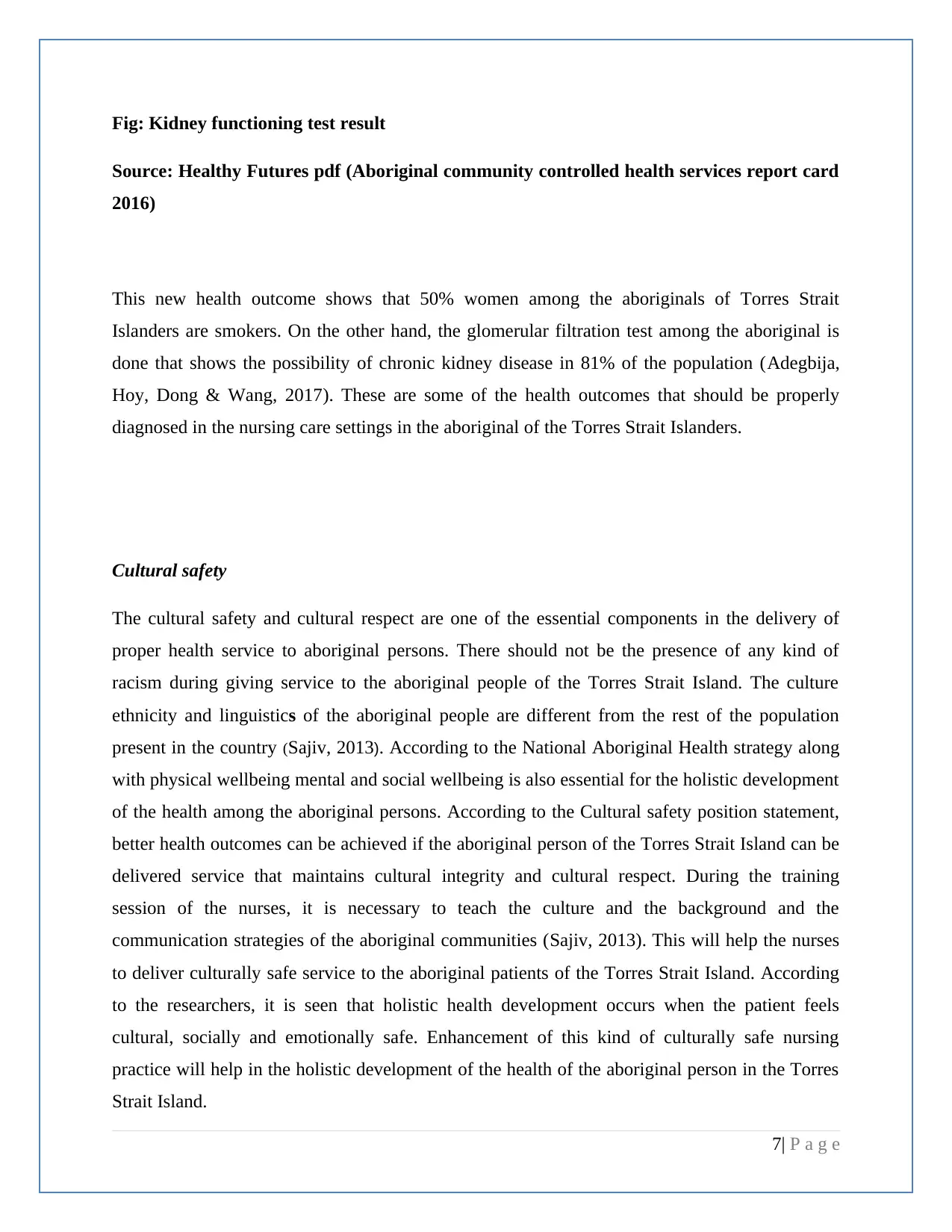
Fig: Kidney functioning test result
Source: Healthy Futures pdf (Aboriginal community controlled health services report card
2016)
This new health outcome shows that 50% women among the aboriginals of Torres Strait
Islanders are smokers. On the other hand, the glomerular filtration test among the aboriginal is
done that shows the possibility of chronic kidney disease in 81% of the population (Adegbija,
Hoy, Dong & Wang, 2017). These are some of the health outcomes that should be properly
diagnosed in the nursing care settings in the aboriginal of the Torres Strait Islanders.
Cultural safety
The cultural safety and cultural respect are one of the essential components in the delivery of
proper health service to aboriginal persons. There should not be the presence of any kind of
racism during giving service to the aboriginal people of the Torres Strait Island. The culture
ethnicity and linguistics of the aboriginal people are different from the rest of the population
present in the country (Sajiv, 2013). According to the National Aboriginal Health strategy along
with physical wellbeing mental and social wellbeing is also essential for the holistic development
of the health among the aboriginal persons. According to the Cultural safety position statement,
better health outcomes can be achieved if the aboriginal person of the Torres Strait Island can be
delivered service that maintains cultural integrity and cultural respect. During the training
session of the nurses, it is necessary to teach the culture and the background and the
communication strategies of the aboriginal communities (Sajiv, 2013). This will help the nurses
to deliver culturally safe service to the aboriginal patients of the Torres Strait Island. According
to the researchers, it is seen that holistic health development occurs when the patient feels
cultural, socially and emotionally safe. Enhancement of this kind of culturally safe nursing
practice will help in the holistic development of the health of the aboriginal person in the Torres
Strait Island.
7| P a g e
Source: Healthy Futures pdf (Aboriginal community controlled health services report card
2016)
This new health outcome shows that 50% women among the aboriginals of Torres Strait
Islanders are smokers. On the other hand, the glomerular filtration test among the aboriginal is
done that shows the possibility of chronic kidney disease in 81% of the population (Adegbija,
Hoy, Dong & Wang, 2017). These are some of the health outcomes that should be properly
diagnosed in the nursing care settings in the aboriginal of the Torres Strait Islanders.
Cultural safety
The cultural safety and cultural respect are one of the essential components in the delivery of
proper health service to aboriginal persons. There should not be the presence of any kind of
racism during giving service to the aboriginal people of the Torres Strait Island. The culture
ethnicity and linguistics of the aboriginal people are different from the rest of the population
present in the country (Sajiv, 2013). According to the National Aboriginal Health strategy along
with physical wellbeing mental and social wellbeing is also essential for the holistic development
of the health among the aboriginal persons. According to the Cultural safety position statement,
better health outcomes can be achieved if the aboriginal person of the Torres Strait Island can be
delivered service that maintains cultural integrity and cultural respect. During the training
session of the nurses, it is necessary to teach the culture and the background and the
communication strategies of the aboriginal communities (Sajiv, 2013). This will help the nurses
to deliver culturally safe service to the aboriginal patients of the Torres Strait Island. According
to the researchers, it is seen that holistic health development occurs when the patient feels
cultural, socially and emotionally safe. Enhancement of this kind of culturally safe nursing
practice will help in the holistic development of the health of the aboriginal person in the Torres
Strait Island.
7| P a g e
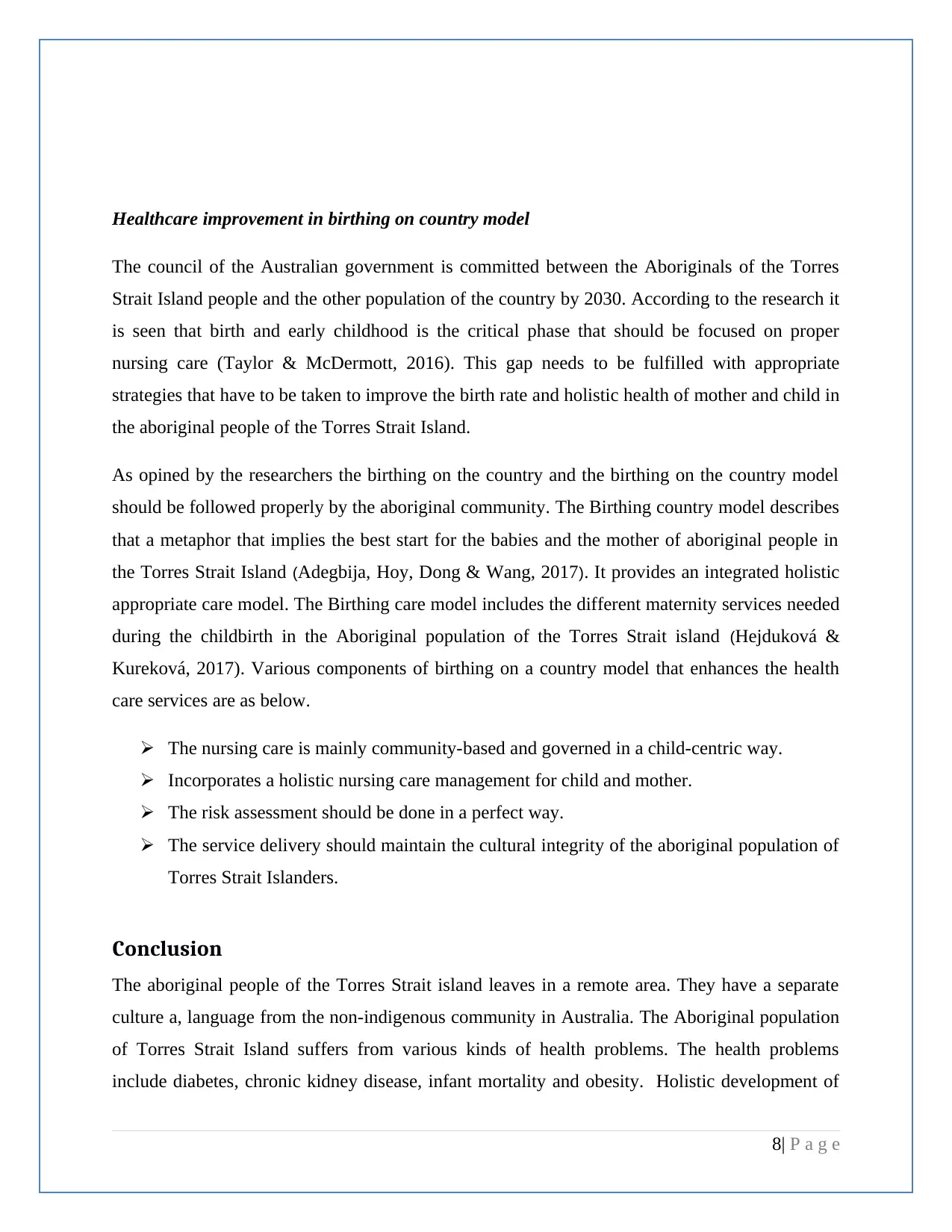
Healthcare improvement in birthing on country model
The council of the Australian government is committed between the Aboriginals of the Torres
Strait Island people and the other population of the country by 2030. According to the research it
is seen that birth and early childhood is the critical phase that should be focused on proper
nursing care (Taylor & McDermott, 2016). This gap needs to be fulfilled with appropriate
strategies that have to be taken to improve the birth rate and holistic health of mother and child in
the aboriginal people of the Torres Strait Island.
As opined by the researchers the birthing on the country and the birthing on the country model
should be followed properly by the aboriginal community. The Birthing country model describes
that a metaphor that implies the best start for the babies and the mother of aboriginal people in
the Torres Strait Island (Adegbija, Hoy, Dong & Wang, 2017). It provides an integrated holistic
appropriate care model. The Birthing care model includes the different maternity services needed
during the childbirth in the Aboriginal population of the Torres Strait island (Hejduková &
Kureková, 2017). Various components of birthing on a country model that enhances the health
care services are as below.
The nursing care is mainly community-based and governed in a child-centric way.
Incorporates a holistic nursing care management for child and mother.
The risk assessment should be done in a perfect way.
The service delivery should maintain the cultural integrity of the aboriginal population of
Torres Strait Islanders.
Conclusion
The aboriginal people of the Torres Strait island leaves in a remote area. They have a separate
culture a, language from the non-indigenous community in Australia. The Aboriginal population
of Torres Strait Island suffers from various kinds of health problems. The health problems
include diabetes, chronic kidney disease, infant mortality and obesity. Holistic development of
8| P a g e
The council of the Australian government is committed between the Aboriginals of the Torres
Strait Island people and the other population of the country by 2030. According to the research it
is seen that birth and early childhood is the critical phase that should be focused on proper
nursing care (Taylor & McDermott, 2016). This gap needs to be fulfilled with appropriate
strategies that have to be taken to improve the birth rate and holistic health of mother and child in
the aboriginal people of the Torres Strait Island.
As opined by the researchers the birthing on the country and the birthing on the country model
should be followed properly by the aboriginal community. The Birthing country model describes
that a metaphor that implies the best start for the babies and the mother of aboriginal people in
the Torres Strait Island (Adegbija, Hoy, Dong & Wang, 2017). It provides an integrated holistic
appropriate care model. The Birthing care model includes the different maternity services needed
during the childbirth in the Aboriginal population of the Torres Strait island (Hejduková &
Kureková, 2017). Various components of birthing on a country model that enhances the health
care services are as below.
The nursing care is mainly community-based and governed in a child-centric way.
Incorporates a holistic nursing care management for child and mother.
The risk assessment should be done in a perfect way.
The service delivery should maintain the cultural integrity of the aboriginal population of
Torres Strait Islanders.
Conclusion
The aboriginal people of the Torres Strait island leaves in a remote area. They have a separate
culture a, language from the non-indigenous community in Australia. The Aboriginal population
of Torres Strait Island suffers from various kinds of health problems. The health problems
include diabetes, chronic kidney disease, infant mortality and obesity. Holistic development of
8| P a g e
⊘ This is a preview!⊘
Do you want full access?
Subscribe today to unlock all pages.

Trusted by 1+ million students worldwide
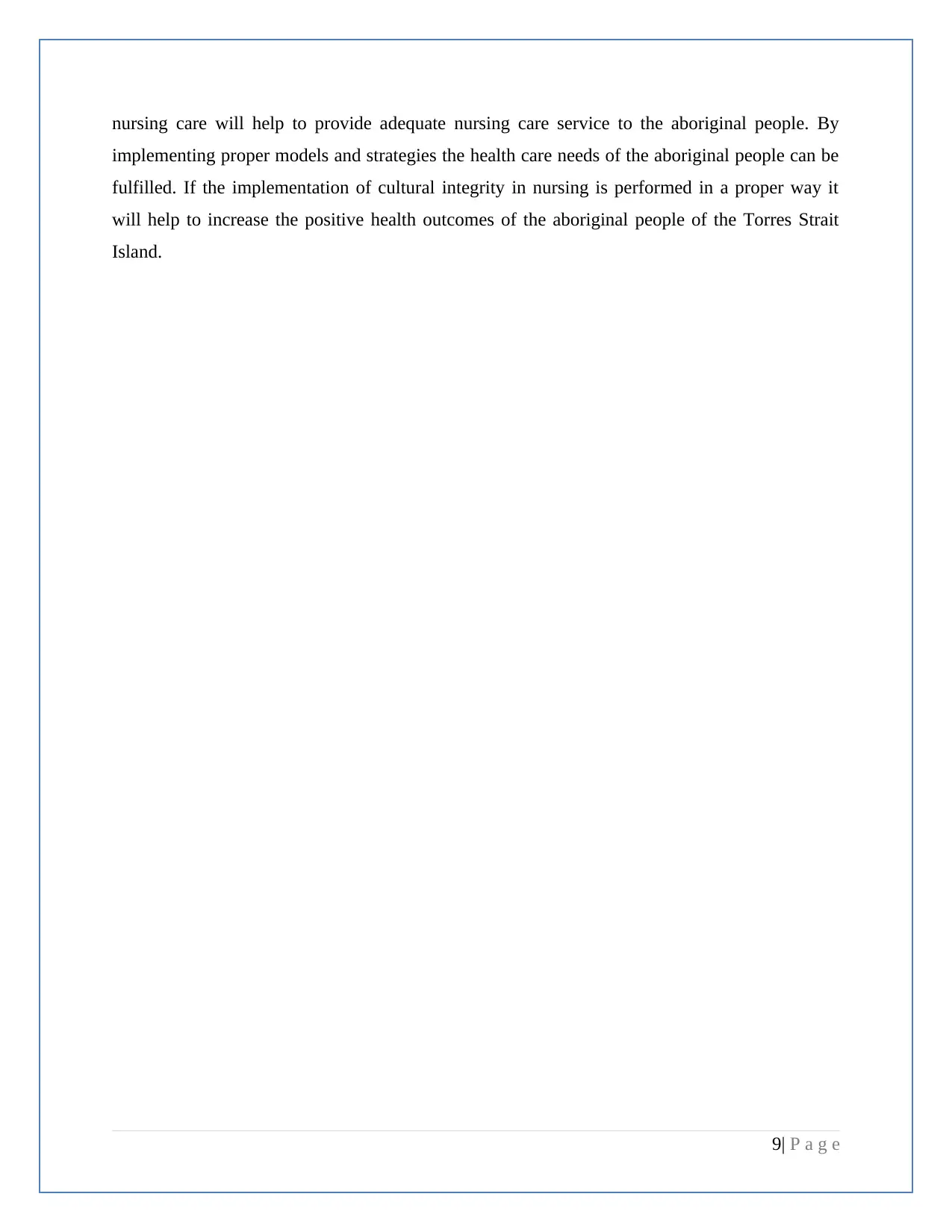
nursing care will help to provide adequate nursing care service to the aboriginal people. By
implementing proper models and strategies the health care needs of the aboriginal people can be
fulfilled. If the implementation of cultural integrity in nursing is performed in a proper way it
will help to increase the positive health outcomes of the aboriginal people of the Torres Strait
Island.
9| P a g e
implementing proper models and strategies the health care needs of the aboriginal people can be
fulfilled. If the implementation of cultural integrity in nursing is performed in a proper way it
will help to increase the positive health outcomes of the aboriginal people of the Torres Strait
Island.
9| P a g e
Paraphrase This Document
Need a fresh take? Get an instant paraphrase of this document with our AI Paraphraser
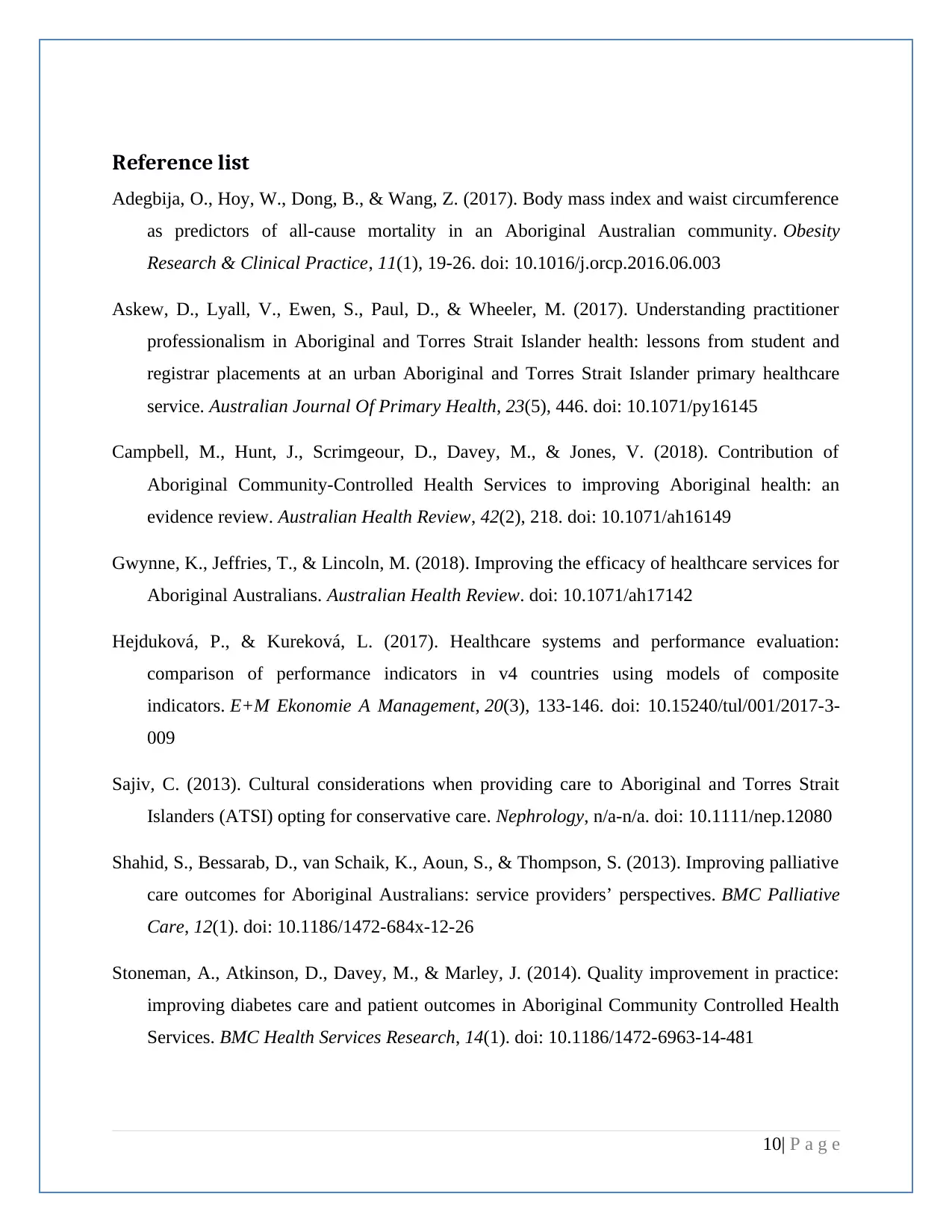
Reference list
Adegbija, O., Hoy, W., Dong, B., & Wang, Z. (2017). Body mass index and waist circumference
as predictors of all-cause mortality in an Aboriginal Australian community. Obesity
Research & Clinical Practice, 11(1), 19-26. doi: 10.1016/j.orcp.2016.06.003
Askew, D., Lyall, V., Ewen, S., Paul, D., & Wheeler, M. (2017). Understanding practitioner
professionalism in Aboriginal and Torres Strait Islander health: lessons from student and
registrar placements at an urban Aboriginal and Torres Strait Islander primary healthcare
service. Australian Journal Of Primary Health, 23(5), 446. doi: 10.1071/py16145
Campbell, M., Hunt, J., Scrimgeour, D., Davey, M., & Jones, V. (2018). Contribution of
Aboriginal Community-Controlled Health Services to improving Aboriginal health: an
evidence review. Australian Health Review, 42(2), 218. doi: 10.1071/ah16149
Gwynne, K., Jeffries, T., & Lincoln, M. (2018). Improving the efficacy of healthcare services for
Aboriginal Australians. Australian Health Review. doi: 10.1071/ah17142
Hejduková, P., & Kureková, L. (2017). Healthcare systems and performance evaluation:
comparison of performance indicators in v4 countries using models of composite
indicators. E+M Ekonomie A Management, 20(3), 133-146. doi: 10.15240/tul/001/2017-3-
009
Sajiv, C. (2013). Cultural considerations when providing care to Aboriginal and Torres Strait
Islanders (ATSI) opting for conservative care. Nephrology, n/a-n/a. doi: 10.1111/nep.12080
Shahid, S., Bessarab, D., van Schaik, K., Aoun, S., & Thompson, S. (2013). Improving palliative
care outcomes for Aboriginal Australians: service providers’ perspectives. BMC Palliative
Care, 12(1). doi: 10.1186/1472-684x-12-26
Stoneman, A., Atkinson, D., Davey, M., & Marley, J. (2014). Quality improvement in practice:
improving diabetes care and patient outcomes in Aboriginal Community Controlled Health
Services. BMC Health Services Research, 14(1). doi: 10.1186/1472-6963-14-481
10| P a g e
Adegbija, O., Hoy, W., Dong, B., & Wang, Z. (2017). Body mass index and waist circumference
as predictors of all-cause mortality in an Aboriginal Australian community. Obesity
Research & Clinical Practice, 11(1), 19-26. doi: 10.1016/j.orcp.2016.06.003
Askew, D., Lyall, V., Ewen, S., Paul, D., & Wheeler, M. (2017). Understanding practitioner
professionalism in Aboriginal and Torres Strait Islander health: lessons from student and
registrar placements at an urban Aboriginal and Torres Strait Islander primary healthcare
service. Australian Journal Of Primary Health, 23(5), 446. doi: 10.1071/py16145
Campbell, M., Hunt, J., Scrimgeour, D., Davey, M., & Jones, V. (2018). Contribution of
Aboriginal Community-Controlled Health Services to improving Aboriginal health: an
evidence review. Australian Health Review, 42(2), 218. doi: 10.1071/ah16149
Gwynne, K., Jeffries, T., & Lincoln, M. (2018). Improving the efficacy of healthcare services for
Aboriginal Australians. Australian Health Review. doi: 10.1071/ah17142
Hejduková, P., & Kureková, L. (2017). Healthcare systems and performance evaluation:
comparison of performance indicators in v4 countries using models of composite
indicators. E+M Ekonomie A Management, 20(3), 133-146. doi: 10.15240/tul/001/2017-3-
009
Sajiv, C. (2013). Cultural considerations when providing care to Aboriginal and Torres Strait
Islanders (ATSI) opting for conservative care. Nephrology, n/a-n/a. doi: 10.1111/nep.12080
Shahid, S., Bessarab, D., van Schaik, K., Aoun, S., & Thompson, S. (2013). Improving palliative
care outcomes for Aboriginal Australians: service providers’ perspectives. BMC Palliative
Care, 12(1). doi: 10.1186/1472-684x-12-26
Stoneman, A., Atkinson, D., Davey, M., & Marley, J. (2014). Quality improvement in practice:
improving diabetes care and patient outcomes in Aboriginal Community Controlled Health
Services. BMC Health Services Research, 14(1). doi: 10.1186/1472-6963-14-481
10| P a g e
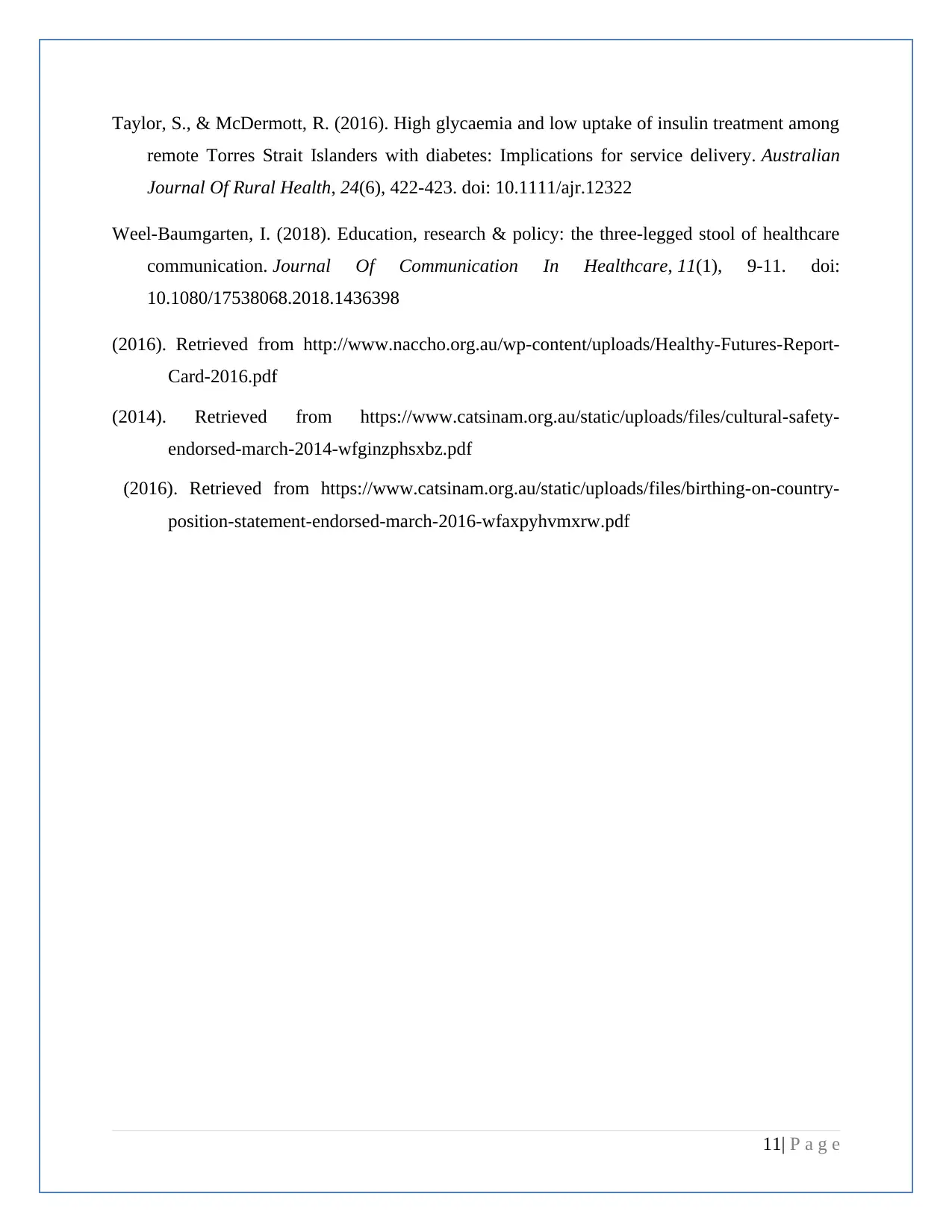
Taylor, S., & McDermott, R. (2016). High glycaemia and low uptake of insulin treatment among
remote Torres Strait Islanders with diabetes: Implications for service delivery. Australian
Journal Of Rural Health, 24(6), 422-423. doi: 10.1111/ajr.12322
Weel-Baumgarten, I. (2018). Education, research & policy: the three-legged stool of healthcare
communication. Journal Of Communication In Healthcare, 11(1), 9-11. doi:
10.1080/17538068.2018.1436398
(2016). Retrieved from http://www.naccho.org.au/wp-content/uploads/Healthy-Futures-Report-
Card-2016.pdf
(2014). Retrieved from https://www.catsinam.org.au/static/uploads/files/cultural-safety-
endorsed-march-2014-wfginzphsxbz.pdf
(2016). Retrieved from https://www.catsinam.org.au/static/uploads/files/birthing-on-country-
position-statement-endorsed-march-2016-wfaxpyhvmxrw.pdf
11| P a g e
remote Torres Strait Islanders with diabetes: Implications for service delivery. Australian
Journal Of Rural Health, 24(6), 422-423. doi: 10.1111/ajr.12322
Weel-Baumgarten, I. (2018). Education, research & policy: the three-legged stool of healthcare
communication. Journal Of Communication In Healthcare, 11(1), 9-11. doi:
10.1080/17538068.2018.1436398
(2016). Retrieved from http://www.naccho.org.au/wp-content/uploads/Healthy-Futures-Report-
Card-2016.pdf
(2014). Retrieved from https://www.catsinam.org.au/static/uploads/files/cultural-safety-
endorsed-march-2014-wfginzphsxbz.pdf
(2016). Retrieved from https://www.catsinam.org.au/static/uploads/files/birthing-on-country-
position-statement-endorsed-march-2016-wfaxpyhvmxrw.pdf
11| P a g e
⊘ This is a preview!⊘
Do you want full access?
Subscribe today to unlock all pages.

Trusted by 1+ million students worldwide
1 out of 12
Related Documents
Your All-in-One AI-Powered Toolkit for Academic Success.
+13062052269
info@desklib.com
Available 24*7 on WhatsApp / Email
![[object Object]](/_next/static/media/star-bottom.7253800d.svg)
Unlock your academic potential
Copyright © 2020–2026 A2Z Services. All Rights Reserved. Developed and managed by ZUCOL.





